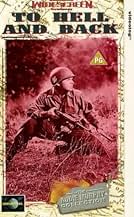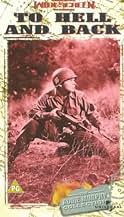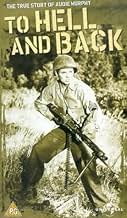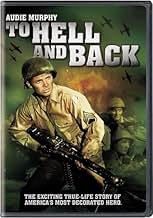CALIFICACIÓN DE IMDb
7.1/10
6.3 k
TU CALIFICACIÓN
La verdadera historia de la II GM de Audie Murphy, el soldado más condecorado de la historia de EE. UU. Basada en la autobiografía de Audie Murphy, que hace el papel de sí mismo en la pelícu... Leer todoLa verdadera historia de la II GM de Audie Murphy, el soldado más condecorado de la historia de EE. UU. Basada en la autobiografía de Audie Murphy, que hace el papel de sí mismo en la película.La verdadera historia de la II GM de Audie Murphy, el soldado más condecorado de la historia de EE. UU. Basada en la autobiografía de Audie Murphy, que hace el papel de sí mismo en la película.
- Premios
- 1 nominación en total
- Dirección
- Guionistas
- Todo el elenco y el equipo
- Producción, taquilla y más en IMDbPro
Opiniones destacadas
I've always Liked watching Audie Murphy's movies since I was a child. I guess it also had to do with the fact that he had that baby face. Being a combat wounded Viet Nam vet, I can relate to his ordeal during and after the war. This man was a caring man who thought of others. Like many other "Medal of Honor" winners; he like the others are not the movie RAMBO hero. They Are "THE REAL McCOYS" It's ironic, though. His last movie in 1971 was called "A time for dying"[A Jesse James movie.] In that same year he died in a small plane crash. A friend of his had once said," all those Germans could not kill him,yet a plane crash near home took his life." My last words are, "May he be with the Lord."
A largely ordinary film about an extraordinary man, To Hell And Back was made a decade after combat soldier Murphy left the service, a natural enough choice of subject matter. Based upon Murphy's book of reminiscences of the same name, the film was viewed as a useful tonic for recruitment after the Korean War by the Army and they co-operated enthusiastically with the studio's production.
After a briefly covering the actor's childhood, the rest of the movie focuses on Murphy's striking military career. With little effort to probe the psychology of its central character, it ends before his discharge. Director Jesse Hibbs does a competent piece of work but Murphy's uniqueness deserved better - someone like Aldrich, Siegel or Samuel Fuller, who around the same time was producing such work as The Steel Helmet and Fixed Bayonet! The cigar-chomping ex-infantryman brought to war projects an essential grit - as well as directorial flair - that's too often missing from To Hell And Back.
Hibbs' version of World War II, made conservatively and with the army looking over his shoulder, lacks the cynicism and bitter truths one can find elsewhere. Indeed a good deal of To Hell And Back, especially during the early parts, is relatively light-hearted. Turned down by the Marines and paratroopers for being underweight in real life, there's a suggestion at the start that Murphy was a little sickly - a poor start for a hero. Hence we see him suffering from sea-sickness on his way to his first combat zone, and then suffering a reaction from his inoculations which, we are told, has laid him up in bed for a week. So much so that his superiors consider sending away from the front line (a fact ruefully recalled later).
What's striking today about To Hell And Back is how ironic it is. Just as 'Murphy' the soldier initially seems an unlikely superhero, so Murphy the actor might be the last person you'd cast as himself (perhaps anticipating this, the star allegedly suggested Tony Curtis for the lead). Unlike the brawling, macho hero figures familiar to cinema audiences, Murphy is boyish and slight looking - young enough, even in 1955, to play himself as a youth. An unassuming if determined character, 'Murphy' is somewhat ill at ease with women (a trait, incidentally, not reflecting real life), one reason why perhaps the 'Italian interlude' of To Hell And Back, when the soldiers are on leave, is the least convincing of the narrative. He's an introspective, diffident character hardly marked out as a leader of men. And yet this is the man who, amongst other acts of extreme valour, stood up on a burning tank with a machine gun to keep the German advance at bay and destroyed several machine gun nests on his own. The man of whom the 3rd Infantry Commander in World War II called "the greatest combat soldier I have ever known" and another Major-General dubbed "beyond a doubt the finest soldier I have ever seen." There's interesting power occasionally in the film too, exactly because the actor's mild, everyman quality disavows those extreme qualities laying hidden below the baby-faced surface, even while the star's real life history affirms them. When Murphy weeps at the death of a newly fallen comrade, although it's just a short scene, the grief seems true and universal; in its modest way a testament to the courage and loss of all fighting men, and not just typical Hollywood emotional artifice. John Ford's work, to take one example, includes moving graveside scenes, but with the likes of poetically manufactured heroes Fonda and Wayne. None have such a unique impact as this.
Such a moment of introspection is unusual in To Hell And Back. Ending as it does with Murphy's war drawing to a close and a parade, understandably the film offers no portrait of the star's later years, decades when he faced stress-related nightmares, health issues, an amount of painkiller dependency and other personal issues. Interestingly at one point the star did consider a sequel to the film, tentatively entitled 'The Way Back', even going so far as reportedly writing a script in 1956, but this idea fell by the wayside.
Murphy, who never considered himself more than a competent actor, wears the mantle of great courage very lightly in his film, just as he did in real life (attempting to give his medals away to relatives for instance). One reason for this is perhaps the star's feelings towards the material. Although To Hell And Back was, unsurprisingly, his most successful film career-wise he admitted to a slackening of interest in events. After all, he'd already done them first hand and then revisited them during the writing of his book, so much so that he "got tired of reliving all these experiences." Murphy saw the purpose of the film as utilitarian as much as entertaining, showing newer infantry what it was really like just as much as pleasing the public. Perhaps the greatest irony of all is that the American military has apparently always preferred Wayne's much more dynamic Sands Of Iwo Jima over this film as classic entertainment for serving ranks.
Murphy won 33 military awards, including every medal of valour America gives, as well as the Legion de Honour and Belgian Croix de Guerre. By contrast his film, although financially successful, received far fewer accolades. Recently reissued in all its widescreen, colour glory and in a good print (if lacking any documentary support) it's still worth a look. For a less compromising view of war on foot, then the aforementioned Fuller is one place to start; for war's doomed romance you'd want to see Sirk's A Time To Live And A Time To Die. But To Hell And Back, with all flaws, is a sobering reminder of what a mighty real hero looks like.
After a briefly covering the actor's childhood, the rest of the movie focuses on Murphy's striking military career. With little effort to probe the psychology of its central character, it ends before his discharge. Director Jesse Hibbs does a competent piece of work but Murphy's uniqueness deserved better - someone like Aldrich, Siegel or Samuel Fuller, who around the same time was producing such work as The Steel Helmet and Fixed Bayonet! The cigar-chomping ex-infantryman brought to war projects an essential grit - as well as directorial flair - that's too often missing from To Hell And Back.
Hibbs' version of World War II, made conservatively and with the army looking over his shoulder, lacks the cynicism and bitter truths one can find elsewhere. Indeed a good deal of To Hell And Back, especially during the early parts, is relatively light-hearted. Turned down by the Marines and paratroopers for being underweight in real life, there's a suggestion at the start that Murphy was a little sickly - a poor start for a hero. Hence we see him suffering from sea-sickness on his way to his first combat zone, and then suffering a reaction from his inoculations which, we are told, has laid him up in bed for a week. So much so that his superiors consider sending away from the front line (a fact ruefully recalled later).
What's striking today about To Hell And Back is how ironic it is. Just as 'Murphy' the soldier initially seems an unlikely superhero, so Murphy the actor might be the last person you'd cast as himself (perhaps anticipating this, the star allegedly suggested Tony Curtis for the lead). Unlike the brawling, macho hero figures familiar to cinema audiences, Murphy is boyish and slight looking - young enough, even in 1955, to play himself as a youth. An unassuming if determined character, 'Murphy' is somewhat ill at ease with women (a trait, incidentally, not reflecting real life), one reason why perhaps the 'Italian interlude' of To Hell And Back, when the soldiers are on leave, is the least convincing of the narrative. He's an introspective, diffident character hardly marked out as a leader of men. And yet this is the man who, amongst other acts of extreme valour, stood up on a burning tank with a machine gun to keep the German advance at bay and destroyed several machine gun nests on his own. The man of whom the 3rd Infantry Commander in World War II called "the greatest combat soldier I have ever known" and another Major-General dubbed "beyond a doubt the finest soldier I have ever seen." There's interesting power occasionally in the film too, exactly because the actor's mild, everyman quality disavows those extreme qualities laying hidden below the baby-faced surface, even while the star's real life history affirms them. When Murphy weeps at the death of a newly fallen comrade, although it's just a short scene, the grief seems true and universal; in its modest way a testament to the courage and loss of all fighting men, and not just typical Hollywood emotional artifice. John Ford's work, to take one example, includes moving graveside scenes, but with the likes of poetically manufactured heroes Fonda and Wayne. None have such a unique impact as this.
Such a moment of introspection is unusual in To Hell And Back. Ending as it does with Murphy's war drawing to a close and a parade, understandably the film offers no portrait of the star's later years, decades when he faced stress-related nightmares, health issues, an amount of painkiller dependency and other personal issues. Interestingly at one point the star did consider a sequel to the film, tentatively entitled 'The Way Back', even going so far as reportedly writing a script in 1956, but this idea fell by the wayside.
Murphy, who never considered himself more than a competent actor, wears the mantle of great courage very lightly in his film, just as he did in real life (attempting to give his medals away to relatives for instance). One reason for this is perhaps the star's feelings towards the material. Although To Hell And Back was, unsurprisingly, his most successful film career-wise he admitted to a slackening of interest in events. After all, he'd already done them first hand and then revisited them during the writing of his book, so much so that he "got tired of reliving all these experiences." Murphy saw the purpose of the film as utilitarian as much as entertaining, showing newer infantry what it was really like just as much as pleasing the public. Perhaps the greatest irony of all is that the American military has apparently always preferred Wayne's much more dynamic Sands Of Iwo Jima over this film as classic entertainment for serving ranks.
Murphy won 33 military awards, including every medal of valour America gives, as well as the Legion de Honour and Belgian Croix de Guerre. By contrast his film, although financially successful, received far fewer accolades. Recently reissued in all its widescreen, colour glory and in a good print (if lacking any documentary support) it's still worth a look. For a less compromising view of war on foot, then the aforementioned Fuller is one place to start; for war's doomed romance you'd want to see Sirk's A Time To Live And A Time To Die. But To Hell And Back, with all flaws, is a sobering reminder of what a mighty real hero looks like.
I liked this movie not so much because it is a great movie ( it is an average war movie of this era) but because it made me reflect about reality versus perception and how you can be very wrong about something by taking it at face value. Let me explain. My perception, If I had to pick a platoon for battle I would never pick Audie Murphy. At 5'5", maybe 110 lbs, a high tinny voice, and hyper-kinetic motion, he seems more like someone that would get killed early and easily, or worse get you killed. The reality, he was the man you wanted in your platoon when the battle started. He was made of heroic stuff. He wasn't a tough talking braggart. He was just a soldier that would do anything to save his brothers and get home alive. He of course isn't the only example of this. He just got his own movie. It was a good thing that he was an actor because John Wayne would have played his part if he hadn't been, which would have been a real shame because you would have lost the true meaning behind the story. Hollywood prefers style over substance. It would have been a true
disservice to all of the short, underweight chirpy men in the world.
Think about Jimmy Stewart and John Wayne, who would you want in your platoon. John Wayne is your probable choice. Now compare Jimmy Stewart's military career with John Wayne's. John Wayne avoided WWII instead using it to advance his career when many of his contemporaries went to war. Jimmy Stewart on the other hand joined the Air Force 9 months before the attack on Pearl Harbor. He had to force the Air Force to let him in because he was under weight. He was a bomber pilot that flew 20 missions. "His wartime decorations included the Distinguished Flying Cross with Oak Leaf Cluster, four Air Medals, and the French Croix de Guerre with Palm." Now who do you want on your side. I'll take the battle hardened, frail looking, stuttering veteran over the tough talking, strapping, strutting Hollywood pretender any day.
So when I watch the movie I think about the reality of Audie Murphy. Which leaves me with the feeling that if you put your heart into it you can do anything. So when you watch the movie think about the reality. You have a 5'5" war hero that actually became a Hollywood action hero which is improbable in itself.
disservice to all of the short, underweight chirpy men in the world.
Think about Jimmy Stewart and John Wayne, who would you want in your platoon. John Wayne is your probable choice. Now compare Jimmy Stewart's military career with John Wayne's. John Wayne avoided WWII instead using it to advance his career when many of his contemporaries went to war. Jimmy Stewart on the other hand joined the Air Force 9 months before the attack on Pearl Harbor. He had to force the Air Force to let him in because he was under weight. He was a bomber pilot that flew 20 missions. "His wartime decorations included the Distinguished Flying Cross with Oak Leaf Cluster, four Air Medals, and the French Croix de Guerre with Palm." Now who do you want on your side. I'll take the battle hardened, frail looking, stuttering veteran over the tough talking, strapping, strutting Hollywood pretender any day.
So when I watch the movie I think about the reality of Audie Murphy. Which leaves me with the feeling that if you put your heart into it you can do anything. So when you watch the movie think about the reality. You have a 5'5" war hero that actually became a Hollywood action hero which is improbable in itself.
10valf
To Hell And Back rates as one of the truly classic and unique movies of our time. To have Audie Murphy himself have to remember and "relive" his war experiences, having been removed from them for only ten years, is unprecedented.The movie is the forerunner of such movies as We Were Soldiers Once...and Black Hawk Down. Although Col. Tom Moore was only an on scene adviser he also relived some of the scenes(his own admission) that were depicted in "..Soldiers..." Black Hawk Down depicted actual footage of the battle. The historical and personal accuracy of these movies is tremendous. Audie, however paid a bitter price. His war experiences tormented him the rest of his life with constant insomnia, depression and anxiety. I was lucky enough to meet him at Suffolk Downs Race Track in 1959 or 1960. I always wondered what became of his siblings and sister. Audie Murphy is a true hero of the twentieth century. Everyone should take note of what true character, integrity and loyalty Audie gave us. Thank you Audie.
This is the thrilling and exciting true-life story of America's most decorated . The authentic WWII story of Audie Murphy , the most decorated soldier in U.S . history . Based on the autobiography of Audie Murphy who stars as himself in the film from his up-bringing as the son of Texas sharecroppers , as his mother dies and he remains orphan and caring his kiddies brothers . He , then , applied for service with the Navy , the Marines and the Army he was turned down by all three branches . However , when he joined his combat unit, one of his superiors considered transferring him out of the company for being unfit for combat . As Audie wages war in Casablanca , Tunez ; he and his detachment (formed by Marshall Thompson , Charles Drake , Jack Kelly , among others) go to Sicily , Palermo until Messina . Later on , they land at Salerno , Naples , Anzio and MountCassino . After that , Murphy and his III Infantry Division formed by valiant ¨Dogfaces¨ (it was a term used during World War II to describe US Army combat infantrymen) disembark in France where take place other bloody battles . As Audie takes on hundreds of enemy soldiers with a machine gun mounted on a tank and he fought in seven major campaigns during World War II .
Acceptable picture based on actual events about about Audie Murphy who plays himself following his Army career in WWII . Murphy won more tan 20 medals , being the most decorated American soldier , including the Congressional Medal of Honor and he was also awarded five decorations by France and Belgium . Features impressive as well as realistic battle scenes punctuated with great heroics sequences . This rendition of Murphy autobiography was professionally directed by Jesse Hibbs and it was a box-office hit for Universal Pictures and its record was apparently not broken until Jaws (1975). Hibbs was an American director of second features , primarily westerns , at Universal in the 1950's . Being especially known for TV series as ¨Perry Mason¨ (1957) , ¨Gunsmoke¨ , ¨Laramie¨ and ¨F.B.I.¨ (1965) as well as Westerns and Thrillers . He directed various Audie Murphy vehicles such as : this ¨To hell and Back¨ (1955) , ¨World in My Corner¨ (1956) , ¨Ride a Crooked Trail¨ (1958) and ¨Medal of Honor¨ .
Based on facts , these are the following ones : The film describes especially the Italian campaign , when Eisenhower and the Allied command is convinced by Winston Chuchill and his General Brook to carry out the Italian invasion . Then , there takes place the ¨Husky Operation¨ (July , 1943) , but it didn't coordinate Montgomery's 8ª Army and Clark's 5ª Army against German General FeldMarschall, Albert Kesselring , and it resulted in a disaster . Kesselring designs the impregnable ¨Gustav line¨ in South Rome and the main bastion : Montecassino . Then , there happens the famous disaster of Anzio and Nettuno under command of General John Lucas . The Allied army formed by 28 Divisions have a hard and complex mission to their destination .
Acceptable picture based on actual events about about Audie Murphy who plays himself following his Army career in WWII . Murphy won more tan 20 medals , being the most decorated American soldier , including the Congressional Medal of Honor and he was also awarded five decorations by France and Belgium . Features impressive as well as realistic battle scenes punctuated with great heroics sequences . This rendition of Murphy autobiography was professionally directed by Jesse Hibbs and it was a box-office hit for Universal Pictures and its record was apparently not broken until Jaws (1975). Hibbs was an American director of second features , primarily westerns , at Universal in the 1950's . Being especially known for TV series as ¨Perry Mason¨ (1957) , ¨Gunsmoke¨ , ¨Laramie¨ and ¨F.B.I.¨ (1965) as well as Westerns and Thrillers . He directed various Audie Murphy vehicles such as : this ¨To hell and Back¨ (1955) , ¨World in My Corner¨ (1956) , ¨Ride a Crooked Trail¨ (1958) and ¨Medal of Honor¨ .
Based on facts , these are the following ones : The film describes especially the Italian campaign , when Eisenhower and the Allied command is convinced by Winston Chuchill and his General Brook to carry out the Italian invasion . Then , there takes place the ¨Husky Operation¨ (July , 1943) , but it didn't coordinate Montgomery's 8ª Army and Clark's 5ª Army against German General FeldMarschall, Albert Kesselring , and it resulted in a disaster . Kesselring designs the impregnable ¨Gustav line¨ in South Rome and the main bastion : Montecassino . Then , there happens the famous disaster of Anzio and Nettuno under command of General John Lucas . The Allied army formed by 28 Divisions have a hard and complex mission to their destination .
¿Sabías que…?
- TriviaA total of 50,000 rounds of ammunition, 300 pounds of TNT, 600 pounds of blasting powder and ten cases of 40% dynamite were required for the filming of the battle scenes.
- ErroresDuring Audie Murphy's Medal of Honor ceremony at the end of the movie, the narrator makes two mistakes as he describes the other decorations for valor that Murphy received: he mentions "a Bronze Star Medal" (Murphy actually received two BSM's); and "a Bronze Star Medal with bronze service arrowhead" (the correct award is the European-African-Middle Eastern Campaign Medal with Bronze Service Arrowhead). The narrator also omits two significant awards that Murphy earned: two Presidential Unit Citations and the Combat Infantryman's Badge.
- Versiones alternativasWest German theatrical version was cut by approx. 5 minutes.
- ConexionesEdited into Vencer o Morir (1967)
Selecciones populares
Inicia sesión para calificar y agrega a la lista de videos para obtener recomendaciones personalizadas
- How long is To Hell and Back?Con tecnología de Alexa
Detalles
- Tiempo de ejecución1 hora 46 minutos
- Relación de aspecto
- 2.55 : 1
Contribuir a esta página
Sugiere una edición o agrega el contenido que falta



































